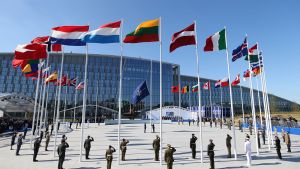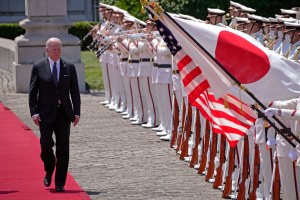The US public views the Japan alliance as a significant national security benefit as concerns about China grow.
The 2023 Chicago Council Survey, conducted September 7–18, finds that as concerns about China take on a greater prominence in US foreign policy and in Tokyo-Washington relations, Americans continue to embrace Japan as an ally. However, the American public remains reluctant to commit US forces to a potential Japan-China conflict over disputed islands.
Key Findings
- American perceptions of Japan’s global influence have risen for the first time in nearly a decade: an average of 6.0 out of 10, up from 5.6 in 2021.
- Americans continue to support US bases in Japan (63%), the second-highest recorded level of support since 2002.
- Three-quarters of Americans (77%) say that the US-Japan security relationship strengthens US national security.
- A majority of Americans (62%) have a great deal or fair amount of confidence in Japan to deal responsibly with world problems.
- Americans’ top priorities for the US-Japan relationship include preventing North Korea from building its nuclear capability (79%), limiting the rise of China’s power (74%), and encouraging Japan to spend more on its own defense (71%).
- A majority of Americans (55%) oppose the use of US troops if China were to initiate a military conflict with Japan over disputed islands.
Americans See Japanese Influence on the Rise
On a 0 to 10 scale, where zero means not at all influential and 10 means they are extremely influential, Americans give Japan an average influence rating of 6.0. This is a notable increase from 2021, when Americans rated Japan an average of 5.6, and is the highest rating Japan has received since 2014. In the 2023 Chicago Council Survey, Japan comes in fourth in global influence behind the United States (8.4), China (7.5), and Russia (6.3), and ahead of other key US allies such as the United Kingdom (5.9), Germany (5.7), Israel (5.4), and South Korea (5.1).
In addition to viewing Japan as an influential nation, the American public views Japanese Prime Minister Kishida Fumio more favorably than most other world leaders asked about in the 2023 Chicago Council Survey. Six in 10 Americans (63%) say they have a very (8%) or somewhat (55%) favorable view of Japan’s prime minister, behind only Ukrainian president Volodymyr Zelenskyy. These favorable views of Kishida fit with a general pattern of Americans viewing Japanese leaders favorably. In prior Council surveys, similar proportions held favorable views of Yoshihide Suga (65% in 2021) and Shinzo Abe (69% in 2018).
US-Japan Alliance Relationship Strengthens US National Security
A large majority of Americans (77%) say that the US-Japan relationship does more to strengthen US national security than it does to weaken it (19%). This view is similarly shared across party lines, with large majorities of Democrats (81%), Republicans (76%), and Independents (74%) all viewing the US-Japan security relationship as beneficial to US national security.
Support isn’t just bipartisan. More Americans view the US relationship with Japan as strengthening US national security than say so for any other country in the region, above allies such as South Korea (71%) and partners such as Taiwan (65%). In fact, out of all the countries asked about in the 2023 Chicago Council Survey, only the US-Germany security relationship is viewed as positively by as many Americans.
Continuing Bipartisan Support for US Bases in Japan
One reason Americans may see the US-Japan relationship as good for US security are the long-term bases the United States maintains in Japanese territory. As the 2023 Chicago Council Survey finds, a majority of Americans (63%) say that the United States should have bases in Japan, continuing the trend of high levels of public support for bases in Japan. Support for basing US forces in Japan also remains bipartisan, with similar proportions of Republicans (65%), Democrats (62%), and Independents (62%) all favoring US bases in the country.
Priorities for the Alliance: North Korea, China, and Defense Spending Boosts
When it comes to priorities for the US-Japan alliance, the American public remains focused on security issues. The American public has long been focused on preventing North Korean nuclear expansion, and it remains a high priority for Americans today. Nearly eight in 10 (79%) say it is a very or somewhat high priority for the US-Japan alliance, largely unchanged from 2012 when 80 percent said the same. But that doesn’t mean Americans want to use the US-Japan alliance to push for regime change in North Korea: only 48 percent of Americans say this is an alliance priority, and as the 2023 Chicago Council Survey shows, North Korea is not a top concern for the American public.
A top concern that is also a priority for Americans in the US-Japan relationship: China. Over the past five years, the American public has grown steadily more likely to view the rise of China as a world power as a critical threat to the United States. With those concerns about China’s power front and center for many Americans, three in four (74%) say that limiting the rise of China’s power is a priority for the alliance. That’s a notable increase from 2012, when only a narrow majority (55%) saw China as a priority for US-Japan activities.
Also on the American public’s agenda: a militarily stronger Japan. Seven in 10 Americans (71%) name encouraging Japan to spend more on its own defense as a priority for the alliance. This was a particular emphasis of the United States under the Trump administration, and while Republicans (79%) are the partisan group most likely to view increasing Japanese defense spending as a priority, two-thirds of Democrats and Independents (68% each) also say it’s a priority for the alliance (see Appendix).
Lastly, despite its importance to the US-Japan relationship, the American public places Japanese foreign direct investment (FDI) relatively low on the priority list. The US and Japan maintain a robust economic relationship; in 2020, Japanese FDI in the United States totaled $648 billion, and Japan remains the fifth-largest trade partner for the United States and its fourth-largest investment partner. However, increasing Japanese investment in the United States is not that high on the alliance agenda for Americans. Only 48 percent say it should be a very (13%) or somewhat (36%) high priority for the alliance.
Americans Remain Opposed to Involvement in Japan-China Conflict
Despite generally positive views of the US-Japan alliance, the American public remains hesitant to commit US forces to a potential conflict with China on behalf of Japan. A majority of Americans (55%) oppose using US troops should China initiate a military conflict with Japan over disputed islands (43% favor), as they have since the Council first asked this question in 2015. This is a bipartisan view, with similar levels of Republicans, Democrats, and Independents opposed to using US forces in such a conflict. Support for sending US troops to such a conflict has been in the low 40s since 2017, and while support among Democrats (45%) is today at its highest point yet, Republican support has declined from its March 2021 peak of 50 percent.
Conclusion
Americans see Japan as a highly influential country on the world stage. They also view the US-Japan alliance as a significant benefit to US national security at a time when Americans are increasingly concerned about the rise of China’s power. As previous polls conducted by the Council and the Japan Institute of International Affairs have shown, those concerns are shared by the Japanese public as well. Those concerns could serve to push the American and Japanese publics even closer together on alliance issues, similarly to how concerns about China have led Japanese and American policymakers to enhance their collaboration on a range of issues. However, fears of China’s growing power could also serve to highlight a significant challenge for alliance managers in Washington and Tokyo: both publics remain reluctant to commit their armed forces to defend the other in a conflict involving China.
This analysis is based on data from the 2023 Chicago Council Survey of the American public on foreign policy, a project of the Lester Crown Center on US Foreign Policy. The 2023 Chicago Council Survey was conducted September 7-18, 2023 by Ipsos using its large-scale nationwide online research panel, KnowledgePanel, in both English and Spanish among a weighted national sample of 3,242 adults aged 18 or older living in all 50 US states and the District of Columbia. The margin of sampling error for the full sample is ±1.7 percentage points. The margin of error is higher for partisan subgroups or for partial-sample items.
Partisan identification is based on how respondents answered a standard partisan self-identification question: “Generally speaking, do you think of yourself as a Republican, a Democrat, an Independent, or what?”
The 2023 Chicago Council Survey is made possible by the generous support of the Crown family, the Korea Foundation, and the United States-Japan Foundation.


Related Content
 Public Opinion
Public Opinion
American public opinion toward Japan has never been warmer, Council data show.
 Public Opinion
Public Opinion
While the American public is hesitant to get involved in a conflict between China and Japan, Americans across party lines want to build strong relations with US allies in Asia.
 Public Opinion
Public Opinion
The 2012 Chicago Council Survey on American public opinion and US foreign policy provides important context for thinking about the future of the US-Japan alliance.


